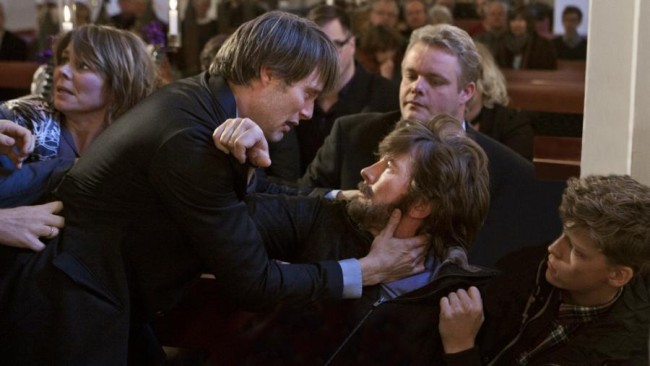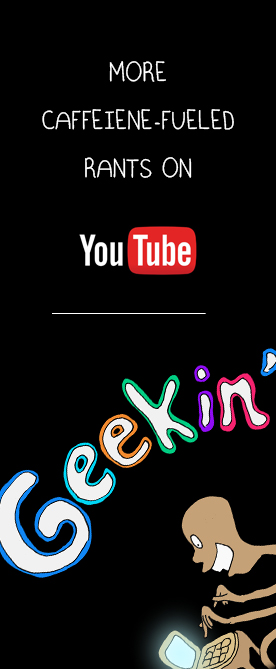The Hunt
dir. by Thomas Vinterberg
Trained in our scopes—beaded down on the bull’s-eye of our aim—are other people. Our judgments click and snap like the charge of a high-powered rifle shot, assassinating anyone and everyone weird, isolated, and only tenuously connected to society in an ostensibly “normal” way. Stray a single step outside the confines of what’s deemed socially correct and—BLAM!—down you go.
In Thomas Vinterberg’s The Hunt, we’re introduced to a tiny Danish town where everyone knows everyone, and where all the men—or at least the upper enchalant of the town’s men—spend their weekends out by the lake hunting and reveling. It’s a hunter’s town. The buck, the rifle, the aim, the kill: it’s in everyone’s blood. It’s like a royal pass-me-down.
Sniping comes common to these people.
Lucas, as played by the great Danish actor Mads Mikkelson (After the Wedding, Casino Royale), is a quiet guy, a lonely guy, who works as an assistant at the local pre-school. In his house it’s just him and his dog, both of whom share a healthy disdain for Lucas’s off-screen ex. Whenever Lucas or anyone else mentions her name, the dog barks up a boom of vitriol in her honor. Lucas’s life isn’t the most stable, but it’s more stable than the blitzkrieg of controversy he’s irrevocably thrust into.
Living next door to Lucas is his hunting buddy Theo (Thomas Bo Larsen). Sometimes Lucas has to walk Theo’s daughter Klara (Annika Wedderkop) home from pre-K because Theo and his wife are too busy arguing about something or another. On those walks, Klara comes to fall in love with Lucas and expresses herself by making him a bedazzled arts-and-craft heart. Lucas is a sensible man and nips Klara’s feelings in the bud, but not completely. Not enough to keep an embarrassed Klara from telling the school’s head lady that Lucas exposed himself to her.
Oh, how capricious the spurned child can be!
Running away with the child’s imagination—as well as her own repressed little factory of thought and condemnation—the pre-school’s head lady decides to believe in the inherent truthfulness of children—as if she’s never been a little selfish, lying snot herself—and puts Lucas’s reputation on full blast. Without weighing both sides, weighing the history they all share with one another, the town instantly forgets all of Lucas’s earlier kindnesses, and—as if by natural, knee-jerk-reaction, as if it’s the easiest option—everyone unblinkingly vilifies Lucas as the local pederast. But he’s not.
What’s most disheartening—and ceaselessly frustrating—about Lucas’s Kafkaesque situation of false damnation is how quickly, and ruthlessly, all of Lucas’s friends bastardize him for a crime he never actually committed. With the haste and severity at which these people scapegoat Lucas, you would think they were willingly hoping for such a monster to arise. The imagination is a great litmus test for gauging a person’s basest of intentions. Judging by the town’s capacity for weaving together a scenario so less-than-human, they wanted something like this to happen. They wanted—maybe even needed—a villain to set their sights on and lash out at in one big, violent swoop. After all, the town’s legacy for hunting runs thick beneath the skin. Like the provincial people of Shirley Jackson’s classic short story The Lottery, the people of Lucas’s town crave that intermittent catharsis of the kill—even if it means warping reality however they see fit to validate it. As many do with hunting, people rationalize their bloodlust with context. “Oh, no, no, it’s okay that we killed these deer. We’re using every shred of meat for sustenance.” “Oh, no, no, it’s okay that we’re gunning for one of our neighbors. He touched our kids.”
This is a mallet of a film. And that’s not to say it’s heavy-handed, but rather it’s relentless in the onslaught of punishment it unleashes upon Lucas. There aren’t enough digits on my hands and toes to count the amount of times I felt like yelling and throwing my shoe at the screen as Lucas sunk deeper and deeper into his quicksand of hell. The man barely catches a moment of reprieve. It’s one of those situations that undeniably proves: there’s no such thing as fair or unfair in the adult world. Things just occur, be it malevolently or otherwise. Nor does it help that people are naturally inclined toward pessimism. It’s far more convenient to assume the worst than believe in the best: cynicism is less challenging to the imagination.
What’s most maddening is how little say Lucas has over the proceedings. No one believes him. Worst of all, no one is willing to hear him out; instead, the adults undisputedly believe everything their children tell them. Without pause, the situation snowballs to such magnitude that no one in town really knows how to handle it. After awhile, it’s no longer the children’s fault that the lie exists and continues to grow. The parents begin to feed their children possible variations of what Klara claimed to happen, dictating the story however their adult imaginations see fit, and the children—bewildered by the communal concern from up above—have no choice but to agree, because to disagree would to go against the ultimate law: mommy and daddy’s law. If mommy and daddy said it happened then it must have. And mommy and daddy can’t possibly believe that their darling angel said what she said because her older brother shoved a picture of an adult male penis in her face while running around with his iPad. That’s too complicated an answer, too full of minutiae and messy human folly. It’s too steeped in happenstance to consider. But not pedophilia. That’s easy. That’s an evil we can wrap our hands around and choke.
Like he did with his earlier masterpiece, The Celebration—which also concerned itself with child abuse—director Thomas Vinterberg runs the gambit of pushing his audience over the edge of total exhaustion. The punishment comes and comes, and then when Lucas isn’t around, it transfers over to his son who is pushed and punched at by Lucas’s former friends. Someone kills Lucas’s dog, his girlfriend doubts him, other people—not even his ex-wife—make sure his son doesn’t move in with him. And, even worse, no one believes him, nor does anyone ask questions. Everything’s taken at face value. Rarely do we—the audience—find a moment to breathe, to celebrate, to hoot and holler for even the most minuscule of victories. Rarely—thankfully: only rarely. Graciously, Vinterberg bestows upon our protagonist—as well as us—a moment of dignity. Trundling into the local supermarket with his head forced high, Lucas attempts to order a cut of meat from the butcher, but is told to fuck off. Lucas tries to order again. Same response. Lucas refuses to move. Around comes the butcher, big and meaty, like the slabs of carcass he deals with, and pummels Lucas until he’s finally ready to leave. Blazing with shame, Lucas re-enters the store, and without warning, knocks the butcher out. He wails and wails at the butcher until the manager finally skips over and orders the cashier to ring Lucas up. It’s not just a victory, but a bloody victory, visceral and full of red. It’s the perfect catharsis for us.
The frustration brewing inside of us—very much like the frustration of Lucas’s neighbors—is of a vicious makeup. There’s no other way of communicating just how beleaguered we’ve become of the town’s ostensible stupidity other than the way Vinterberg depicts it: through violence. You start to wonder at this point: are we—Lucas and us—just as complicit in the sensationalistic brouhaha? Are we, too, ready to absolve all the bullshit by fighting fire with fire, by allowing our basest intentions to run rampant? Is the only sensible reaction to trump all this unjust behavior down pound-for-pound?
Unfortunately, the film loses some of its steam in its final coda.
At first.
We jump ahead about a year to a hunter’s ceremony where the town has presumably moved on and accepted Lucas back into the fold. They’re all there to celebrate Lucas’s son’s induction into the hunter’s club by gifting him his ancestor’s rifle. Once again: all that violence and power placed into the hands of the irresponsible youth. How short our memories seem to be. The sequence is odd—unsettling even—in its tidiness, especially compared to the film’s first two hours. We don’t know what, but something’s off. Lucas reconnects with Klara, the townspeople trust him again, his girlfriend returns to him, and, most importantly, he returns to the hunt, no longer the prey for everyone else to murder. Out in the sticks, while hunting, a deer presents itself some ten yards away from Lucas. Lucas doesn’t want to shoot it. He lets it be. The silence of the woods come over him, lulling him into comfort. Everything’s back to how it should be. But then it happens: a flit and a CRACK! A bullet whizzes by his head and splinters the tree behind him. Up on the hill is a silhouette. No face, no identity, just a blob of human dimension. All have forgiven, but still, there’s someone out there who hasn’t forgotten, who still believes the narrative. The missed shot serves as a reminder to Lucas: this will hang over you, like a pall, forever tarnishing whatever slice of perfection you thought you might have had. Because once the information spins out into the world unbound by context, mountains have to be moved just to convince people of its fallacy. No easy feat given our world’s propensity for the literal.






